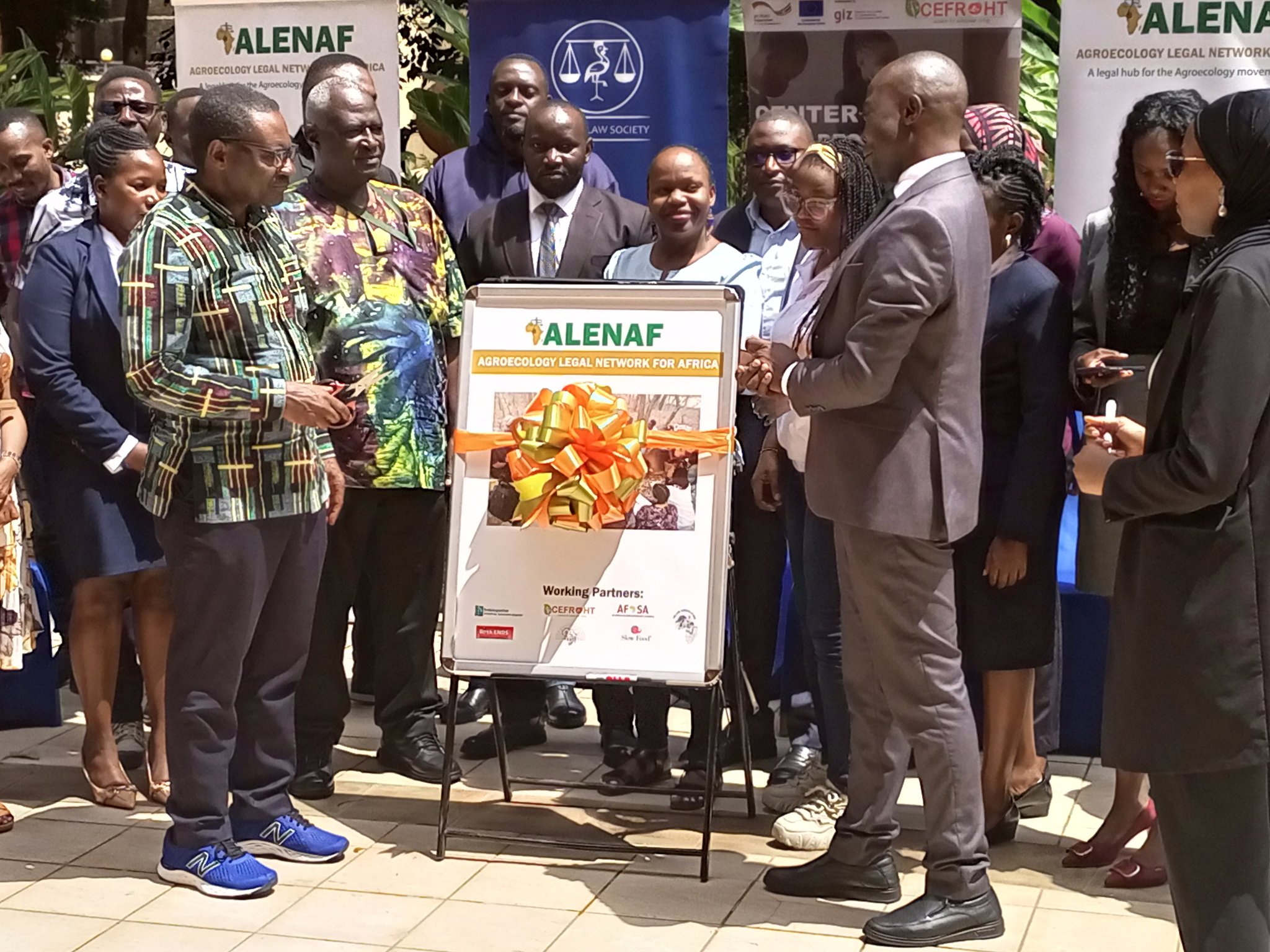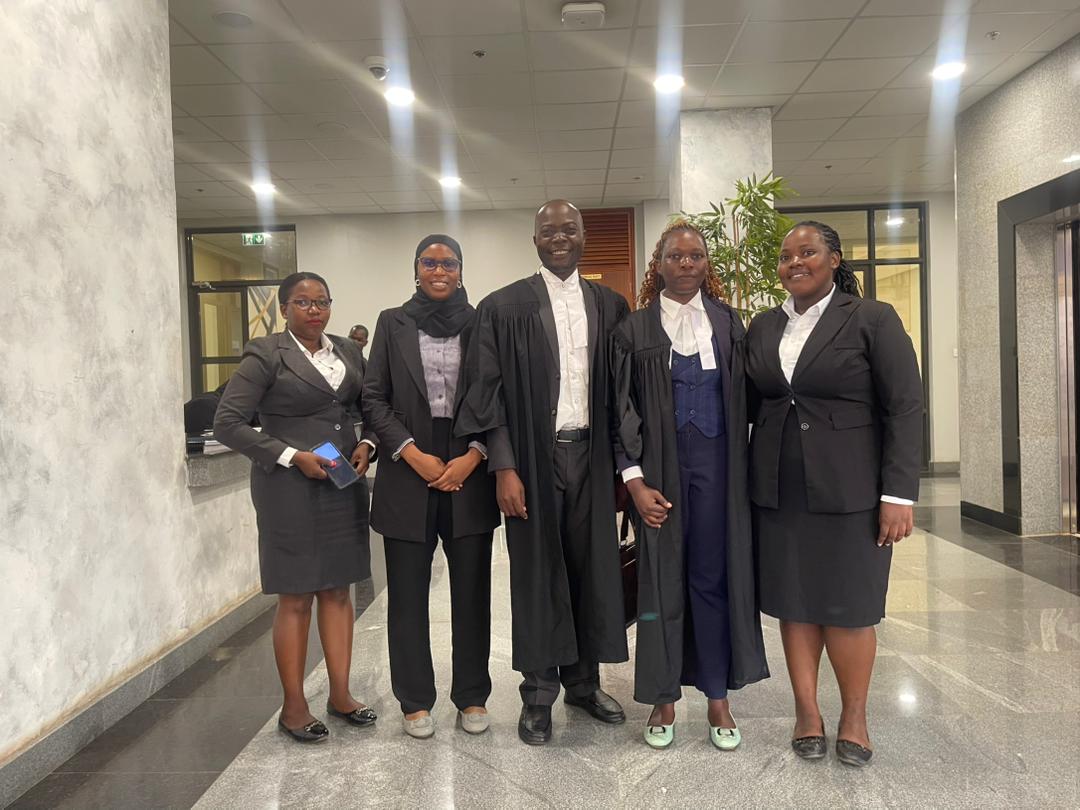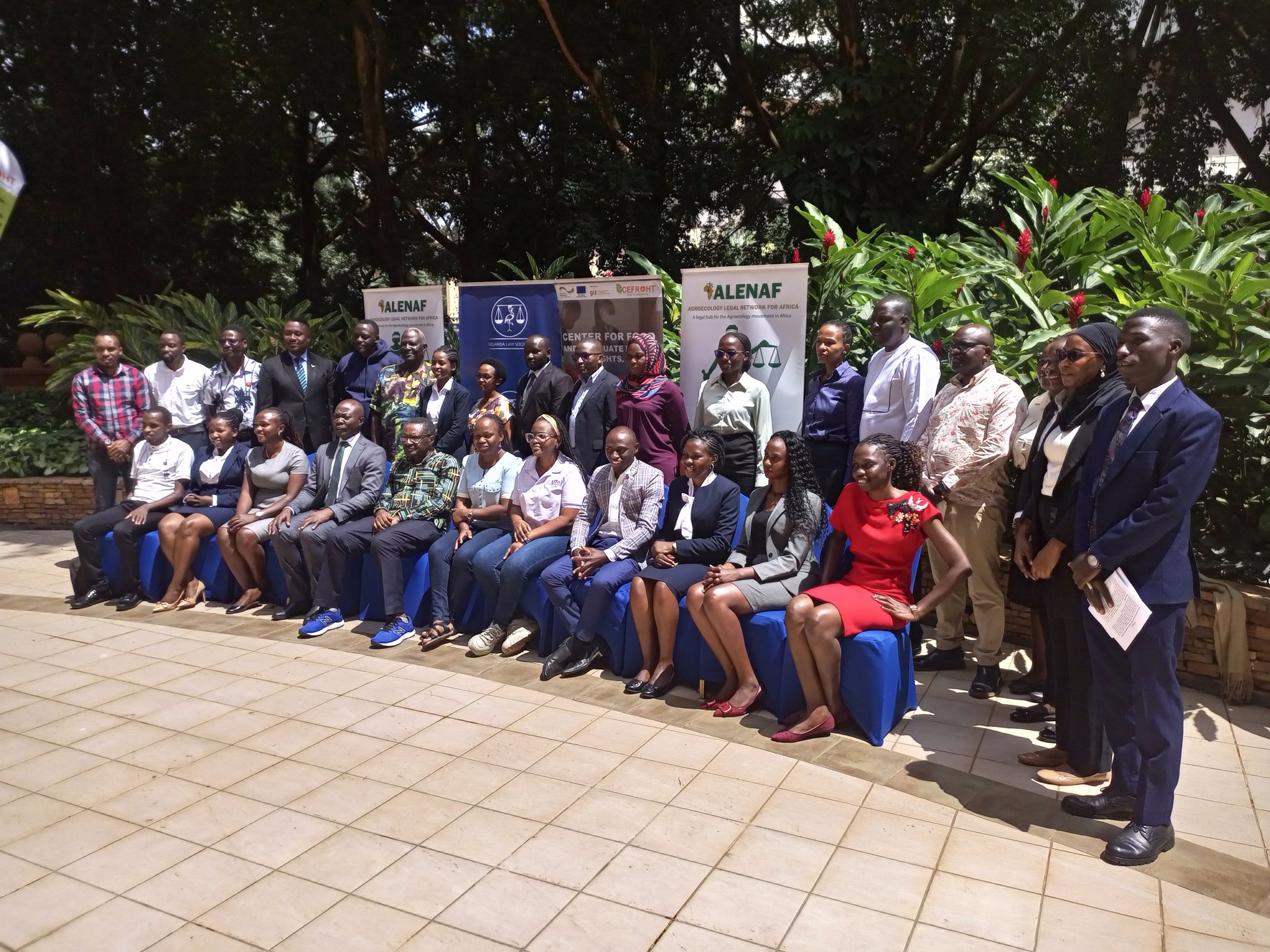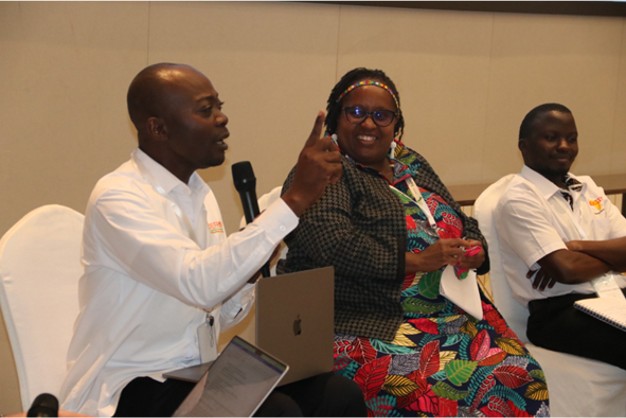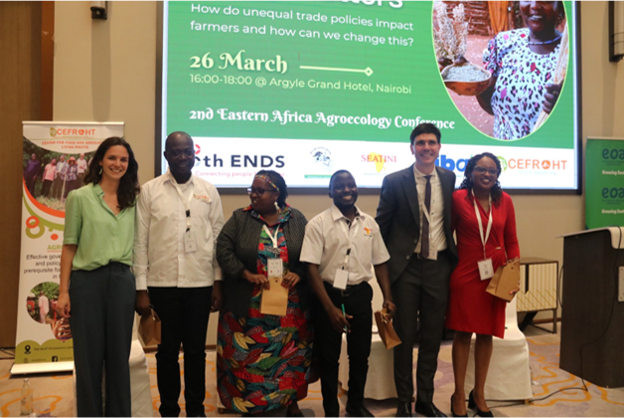Promoting agroecology through legal, institutional and policy frameworks within East Africa
Uganda, other countries in East Africa
Lead organization
CEFROHT is an indigenous not-for-profit legal advocacy and action-research organization based in Uganda using a human rights-based approach to promote adequate food and adequate living. They use legal tools to ensure the realization of land rights, food security, food safety and nutrition, livelihood rights, environmental health, and mainstreaming a food systems approach.
Partner organizations:
The Food and Agriculture Organization, Alliance for Food Sovereignty in Africa (AFSA), Slow Food-Uganda, Eastern and Southern African Farmers’ Forum (ESAFF-Uganda).
Main beneficiaries
Local governments, the most vulnerable and affected small holder farmers, East African Community Secretariat, East African Legislative Assembly, CSO partners working on Agroecology in East Africa, Agroecology Movements, academia.
Country
Uganda and other Eastern African countries.
Timeline
2024-2027
Funding
DKA- Austria and BOTH Ends. Budget: 83,247.22 Euros
Mission
To support comprehensive legal, Institutional and policy frameworks that promote agroecology, seed equity food and nutrition security in the East African region.
Context
Uganda and the wider East Africa is experiencing an influx of industrial agricultural practices, including GMOs, monoculture systems, and chemical-intensive farming, which undermine traditional food systems, biodiversity, and seed sovereignty. This threatens the livelihoods of millions of smallholder farmers; no wonder there is an estimated 62 million food-insecure people in East Africa.
Agroecology offers a holistic approach to agriculture and a sustainable solution to the above challenges, prioritizing climate resilience, soil health, biodiversity conservation, food security, social justice, and human well-being.
Although there are efforts from Civil Society and some governments within the Eastern African Community to promote agroecology, these efforts are about to be lost with the passionate and advent of industrial agriculture practises being introduced in the region with very weak legal, institutional and policy frameworks. There is no guard against biodiversity loss, bio-piracy, servitude and rural economies suffocation.
Furthermore, the Eastern African Community has not yet fully integrated agroecology into the Eastern African Community’s trade framework. It is now challenging for farmers to export their produce smoothly due to the lack of standardized standards and member states’ uneven recognition of agroecological certifications, any smallholder farmers face obstacles including complicated customs procedures and expensive transportation costs that restrict their access to regional markets, despite the growing demand for sustainably produced goods.
All Eastern African Community partner states in East Africa agreed to be bound under the Eastern African Community Treaty. Any law that is made and passed at East African level supersedes the national and municipal laws.
As Civil Society, there is need to bridge this gap before the industrial agriculture sponsors and influences a law or policy in this regard. Secondly, such a law with institutional understanding at East African level will promote agroecology, seed sovereignity and trade at a regional scale and the adaptation to climate change.
> 5 billion/year in Africa (25% of total)
Strategy
CEFROHT implemented this project using multi-dimensional, human-rights based and partnership strategy combining legal advocacy, policy reform, institutional capacity building, community empowerment, and market support approaches to strengthen agroecology promotion, ensuring that agroecology becomes a viable, scalable, and sustainable model for resilient food systems in East Africa.
Objectives
- To build and strengthen the capacity of the EALA, EAC Secretariat, EAC cabinet ministers on agroecology in view of enacting a comprehensive regional policy on agroecology.
- To strengthen institutional frameworks for promotion of agroecology at the E.A. level.
- To promote seed equity and sovereignty in E.A through addressing policies that promote GMOs in the East African Court of Justice.
- To provide the legal justification for inclusion of human rights-based approach and pro-people cantered frameworks in the EAC Seed and Plant Varieties Bill that protect indigenous seed varieties, with specific provisions on Farmer Managed Seed Systems (FMSS).
- To promote biodiversity and seed sovereignty in E.A through addressing policies that promote GMOs and EACOP in the East African Court of Justice.
Activities
- In 2024, working with FAO, CEFROHT held a capacity building session with the EALA Agriculture, Tourism and Natural Resources (ATNR) Committee, which culminated into a resolution recognizing agroecology as strategic priority for formulating sustainable policies in agriculture, tourism and natural resources management across the east African region to support the development of an EAC regional framework on Agroecology.
- Held bilateral capacity building meetings with the EAC Secretariat and EALA members to strengthen their understanding of agroecology and developed a clear roadmap for an EAC Agroecology Policy and Law.
- CEFROHT joined the 2nd Agroecology Conference and in Nairobi and hosted a side event and also presented papers. These highlighted the urgent to need to support formulation of a common agroecology framework law or policy that will shape policy discussions at the EAC level and the role of women and youth in advancing agroecology, focusing on inclusive policy and legal frameworks. See here the papers here and here.
- Together with Both ENDS, BIBA-Kenya, SEATINI and other partners, organized a side event on embedding Agroecology in Trade Policy at regional forums, calling for AfCFTA reforms to protect farmers, seed sovereignty, and certification of agroecology products.
- Worked with EALA members to pass a motion to develop a Regional Model Policy on Agroecology and regional detailed agroecology report, highlighting the need for legal reforms to protect smallholder farmers and promote climate-resilient food systems, advancing political support within the East African Community.
- Following the EALA motion, engaged FAO to further the formulation processes of coming up with an East African Community framework law or Policy on Agroecology.
- Built the capacity of smallholder farmers in social accountability and advocacy skills, enabling them to demand reforms and hold leaders accountable for their inaction or lobby for local government support towards agroecology.
- Established and launched the Agroecology Legal Network for Africa (ALENAF), a legal hub for Agroecology and a Pan-African initiative uniting lawyers, legal scholars, civil society, and farmer groups to use the law to defend agroecology, food sovereignty, and ecological justice.
Read more information about the Agroecology Legal Network for Africa (ALENAF):
Watch the launch. How to join?
- Supported empowered farmers to organize and hold community barazas, where they engaged duty bearers on agroecology needs in areas of seeds, organic agrochemicals, markets, irrigation.
- Supported farmers through Agroecology Learning Centers which are established incubation hubs for sustainable farming, eco-enterprise, and legal literacy. Farmers transitioned from conventional to agroecological farming while learning their rights and engaging local governments on obligations.
- We have filed 10 public interest litigation cases since 2023 and 2 out of the 10 in the East African Court of Justice, all in pursuit of the right to adequate Among them:
- They filed a case in the East African Court of Justice concerning a Genetically Modified Organism against the Kenya government’s actions of lifting the ban on the cultivation within and importation into the republic of Kenya of genetically modified food and seeds.
- They filed a case concerning the East African crude oil pipeline (EACOP) against the governments of Uganda and Tanzania, and the East African Community, challenging the construction of the EACOP project arguing that the project violates various provisions of the East African Community Treaty and the Protocol for Sustainable Development of the Lake Victoria Basin, as well as human rights and environmental considerations.
- They filed a case to Uganda High court to ban glyphosate-based chemicals use, sales and importation in Uganda and properly regulate agricultural chemicals that violate the constitutional rights on health, life, adequate food and a clean environment.
- Provided legal representation in the GMO and EACOP cases at the East African Court of Justice, including the EACOP hearing scheduled for 24th February 2025 in Rwanda.
- We believe in the right to land as a cardinal principle for agroecology promotion. We have filed and handled 511 Pro bono cases of which were resolved both in court and also through non- contentious community-based mechanism, promoting land security as a foundation for Agroecology realizing that there is an intricate link between land rights in ensuring food security.
Impacts and lessons learned
Outcomes and results:
The East African Legislative Assembly (EALA) officially recognized agroecology as a strategic priority for sustainable policies in agriculture, tourism, and natural resource management across East Africa.
- A motion was passed at EALA calling for the development of a Regional Model Policy on Agroecology, laying the foundation for harmonized legal and policy frameworks, a major step toward sustainable farming and food security in the EAC.
Read the motion here.
- The East African Legislative Assembly Committee on Agriculture Tourism and Natural Resources presented on the floor of the Assembly a detailed agroecology report, highlighting the need for legal reforms to protect smallholder farmers and promote climate-resilient food systems. Together, the motion and the report pave the way for a unified regional policy on agroecology. Read the report here.
- CEFROHT in a working partnership with the FAO, EAC Secretariat and the EALA-ATNR committee developed a roadmap for an East African Community framework law and policy on Agroecology.
- CEFROHT established and launched the Agroecology Legal Network for Africa (ALENAF) a pan African legal network uniting lawyers, civil society, scholars and farmer groups to defend Agroecology, food sovereignity, and ecological justice. This has become a hub for advocacy, knowledge-sharing and litigation support across Africa.
- Hosted and participated in regional conferences and side events, producing papers and reports highlighting agroecology’s role in food security, climate resilience, and gender-inclusive policy.
- Advocated for embedding agroecology into regional trade frameworks, including AfCFTA reforms for seed sovereignty and certification of agroecology products.
- Built farmers’ capacity in social accountability, advocacy, and rights-based approaches, enabling them to influence local and regional policies.
- Agroecology Entrepreneurial Community of Practice has been established, enabling farmers to transition from conventional to sustainable agroecological farming.
- Through Agroecology Learning Centers, territorial markets, and strong local government collaboration, farmers receive training, organic inputs, access to levy-free premium markets, and product branding support.
- Local governments mobilize farmer groups into SACCOs, facilitate access to Parish Development Model funds and low-interest loans,
- and enact supportive by-laws, creating an inclusive governance framework that scales agroecology as a viable economic model and strengthens sustainable agri-food systems.
- CEFROHT engaged in strategic meetings with three Local Governments Leaders, Uganda Local Government Association (an umbrella organization for all Local Governments in Uganda) and Ministry of Agriculture Animal Industry and Fisheries (MAAIF) on partnerships to promote Agroecology and ensure governance, accountability, and the law. These identified by-laws, ordinances and community support as key tools in promotion of Agroecology and committed to working together.
- CEFROHT has signed Memorandum of Understanding (MoU) with different District Local Governments to enact bye-laws promoting agroecology, supporting model farmers, and integrating agroecology into the Parish Development Model (PDM).
- The Executive Director of CEFROHT Dr. Kabanda David won this year’s annual Food systems award organized by the Ministry of Agriculture and FAO in recognition of CEFROHT’s work towards a just and sustainable food system in Uganda. This highlights the impactful work CEFROHT is doing to promote the right to adequate food and building a sustainable food system in Uganda.
- 20 legal cases won out of 25 these are land rights cases from the communities that we have litigated using the Human Rights Enforcement Act Cap 12 and they are part of the 511 legal victories.
- 3050 Famers Currently Supported
- 1384 People attended Community Engagements
- 500 Local leaders Involved
- 511 Legal victories for vulnerable women
Lessons learned:
- Strong local governance frameworks, such as district byelaws, are critical for scaling agroecology.
- Need for participation of African countries in the drafting of world trade policies and recommendation complete review of the Protocol of Free Trade Areas and the Rules of Origin in view of alignment of African interests.
- Integrating agroecology into trade and investment policy discussions, especially under AfCFTA, ensures protection for smallholder farmers. Empowering women and youth as agroecology champions enhances resilience, community adoption and citizen agency.
- Promotion of agroecology needs a multisectoral approach. Its incorporation with law and policy legally binds governments to protect and promote agroecology and protect smallholder farmers’ interests.
Challenges/limiting barriers:
- Industrial industry interference: these industrial agriculture actors directly or indirectly interfere in policy making processes through industrial agriculture narratives, lobby policy makers, issue legal threats, and sponsor counter- research from farmer action-research.
- Women are small-scale farmers and are the most exposed to right to food and land right issues.
- Limited awareness of agroecology and its relatedness to food and nutrition security among policy makers.
We are planning to harmonize regional agroecology policies, advocate for agroecology-related research and training investments, and improve market access for organic products.
Together, we must position ourselves to influence EAC and African Union policy processes that advance agroecology and protect the rights of smallholder farmers.
Together with like-minded partners, we must sustain the good work and momentum to shape policies that advance agroecology and secure resilient food systems in Africa.
Hyperlinks
Contact
Doreen Akware, Program Manager, CEFROHT, doreen.akware@cefroht.org

